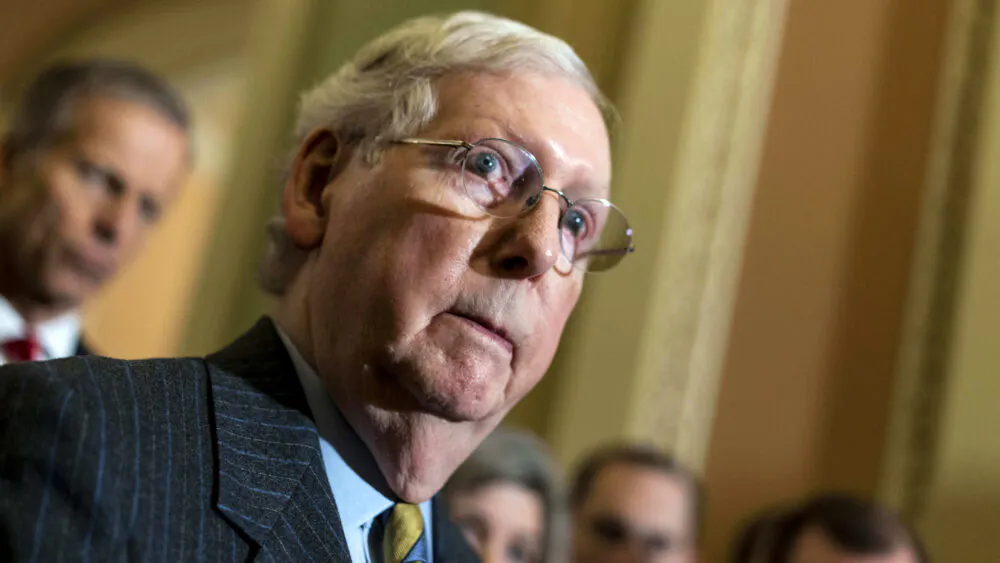Senate Majority Leader Mitch McConnell has announced on Monday that he is giving House Democrats’ impeachment managers and President Donald Trump’s legal defense team 24 hours each to make their opening arguments stretched over a two day period starting this Wednesday.
“The President and the House of Representatives shall have until 9:00 a.m. on Wednesday, January 22, 2020, to file any motions permitted under the rules of impeachment with the exception of motions to subpoena witnesses or documents or any other evidentiary motions,” McConnell’s resolution stated. “Responses to any such motions shall be filed no later than 11:00 a.m. on Wednesday, January 22, 2020. All materials filed pursuant to this paragraph shall be filed with the Secretary and be printed and made available to all parties.”
“Arguments on such motions shall begin at 1:00 p.m. on Wednesday, January 22, 2020, and each side may determine the number of persons to make its presentation, following which the Senate shall deliberate, if so ordered under the impeachment rules, and vote on any such motions,” the resolution added.
“Following the disposition of such motions, or if no motions are made, then the House of Representatives shall make its presentation in support of the articles of impeachment for a period of time not to exceed 24 hours, over up to 2 session days,” the resolution continued. “Following the House of Representatives’ presentation, the President shall make his presentation for a period not to exceed 24 hours, over up to 2 session days. Each side may determine the number of persons to make its presentation.”
“Upon the conclusion of the President’s presentation, Senators may question the parties for a period of time not to exceed 16 hours,” the resolution continued. “Upon the conclusion of questioning by the Senate, there shall be 4 hours of argument by the parties, equally divided, followed by deliberation by the Senate, if so ordered under the impeachment rules, on the question of whether it shall be in order to consider and debate under the impeachment rules any motion to subpoena witnesses or documents. The Senate, without any intervening action, motion, or amendment, shall then decide by the yeas and nays whether it shall be in order to consider and debate under the impeachment rules any motion to subpoena witnesses or documents.”
“Following the disposition of that question, other motions provided under the impeachment rules shall be in order,” the resolution concluded. “If the Senate agrees to allow either the House of Representatives or the President to subpoena witnesses, the witnesses shall first be deposed and the Senate shall decide after deposition which witnesses shall testify, pursuant to the impeachment rules. No testimony shall be admissible in the Senate unless the parties have had an opportunity to depose such witnesses.”
The Senate will then vote on whether to convict or acquit the president on each article of impeachment at the end of the deliberations by the Senate.
Senate Minority Leader Chuck Schumer decried McConnell’s schedule, claiming without evidence that McConnell was trying to make it “much more difficult to get witnesses and documents” involved in the trial.
Schumer is making his claims in bad faith as he has previously dismissed the notion that witnesses should be involved in a Senate impeachment trial because they are supposed to be interviewed by the House, which did not call all of the witnesses in Trump’s case.
In 1999, during the impeachment of Democrat President Bill Clinton, a reporter asked Schumer, “You said that one of the reasons they didn’t call witnesses in the House was to accommodate Democrats. How do you respond to that?”
“Let me say this idea that they didn’t have to call witnesses in the House and they should call them in the Senate doesn’t make sense,” Schumer responded. “You call witnesses before a grand jury and you call witnesses before a trial. So, there were some on my side, I was not among them, but some on my side who argued strongly that they outta call witnesses and they resisted it every step of the way.”
“There has not been a good explanation why 60,000 pages of testimony was good enough for the House but isn’t good enough for the Senate,” Schumer continued.

.png)
.png)

